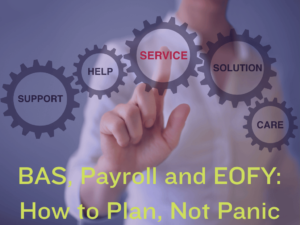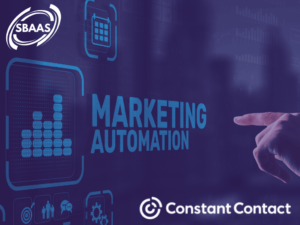ARTICLES

Thriving Amid Global Tariffs: Essential Strategies for Australian Businesses
Explore how Australian businesses can navigate global tariffs and trade shifts effectively. Gain strategic insights to mitigate risks and leverage opportunities amidst changing international trade dynamics.

Stop Guessing: Is Your Business Really Healthy? Here’s How to Know for Sure
Is your business on track or slowly heading for trouble? Use our comprehensive SME Health Checklist to uncover risks, seize opportunities and take confident steps towards sustainable growth.

Capturing Consumer Attention – Strategic Insights for Australian Small Businesses
Discover strategies for Australian small businesses to capture consumer attention amid evolving trends effectively. Explore insights into consumer sentiment, agentic AI, and commerce media to boost competitiveness and growth.

One Wrong Step: Why Skipping Appropriate Policies and Procedures Can Sink Your Small Business
Australian small businesses move fast, yet too many forget that appropriate policies and procedures are their first line of defence. From six-figure Fair Work penalties to privacy fines that reach the tens of millions, ignoring documentation can drain cash flow,

Decode Before You Commit: Navigating Grant Jargon, What to Look for Before You Apply
Grants can fuel growth, but only if you understand what you’re signing up for. Learn how navigating grant jargon before you apply can save time, money, and missed opportunities.

The Vanity Trap: What Small Businesses Get Wrong About Social Media Metrics
Impressions aren’t impact. Likes aren’t loyalty. Discover what small businesses get wrong about social media metrics, and how to track what actually drives growth and revenue.

Stop the Scramble: BAS, Payroll and EOFY – How to Plan, Not Panic
Deadlines shouldn’t feel like danger zones. Learn how Australian SMEs can prepare for BAS, payroll and EOFY with calm, clarity, and confidence, before the pressure hits.

AI Isn’t Just for Tech Giants: How Australian Small Businesses Can Harness It Today
Artificial intelligence is no longer out of reach for small businesses. Discover how your business can benefit from practical, affordable, and effective AI tools today.

Dead Ends or Gold Mines? How to Identify Which Tenders or Grants Are Actually Worth Your Time
With thousands of tenders and grants available, most businesses waste time chasing the wrong ones. Learn how to identify which tenders or grants are actually worth your time—and how to stop gambling and start strategising.

Why Flying Solo Is Costing You More Than Sleep—and How SBAAS Full Service Coaching Helps
Why Flying Solo Is Costing You More Than Sleep—and How SBAAS Full Service Coaching Helps When “Doing It All” Starts to Feel Like Doing Too Much Running a small business in Australia is a bit like trying to keep a

“I Thought I Did Everything Right”: A Small Business Owner’s Wake-Up Call About Fair Dismissal
“I Thought I Did Everything Right”: A Small Business Owner’s Wake-Up Call About Fair Dismissal Navigating Employee Disputes in the Fitness Industry with SBAAS by Your Side Running a small business isn’t just about balance sheets and marketing plans—it’s deeply

Fair Work Crackdown: Over $800,000 in Penalties Sends Clear Message to Small Business Employers
Fair Work Crackdown: Over $800,000 in Penalties Sends Clear Message to Small Business Employers Fair Work Cases: A Wake-Up Call for Small Business Owners in 2025 Australian small business owners are under increased scrutiny as recent Fair Work cases

Cutting the Red Tape Trap: The Preliminary Results are in
Cutting the Red Tape Trap: The Preliminary Results are in Preliminary results are in, but first – thanks BNI Australia April was huge. On the first Monday of the month, SBAAS published Reducing Red Tape for Australian Small Businesses: Economic

The IT Blindspot That’s Putting Your Business at Risk – And How to Fix It Before It’s Too Late
Your “I Don’t Do IT” Attitude is a Ticking Time Bomb – And It’s About to Explode You’re a busy small business owner. You’re focused on growth, on innovation, on building a successful business. I get it – on some

Cutting the Red Tape Trap: How Smarter Regulation Will Supercharge Australian Small Businesses
Cutting the Red Tape Trap: How Smarter Regulation Will Supercharge Australian Small Businesses Small businesses are the heartbeat of Australia’s economy. Yet, despite their enormous contribution, they are shackled by layers of outdated, excessive, and often confusing regulations. Reducing red

2025 Budget vs Coalition Predecessors – A Small Business Perspective
2025 Budget vs Coalition Predecessors – A Small Business Perspective Australia’s 2025 Federal Budget arrives in a charged political atmosphere, with an election imminent and over two million sole traders and small business owners watching closely. This analysis cuts through

Generative AI Revolution: The New Era for Australian Small Businesses
Generative AI Revolution: The New Era for Australian Small Businesses Australian small businesses are on the cusp of a generative AI revolution. From plumbers using smart leak detection to aged care providers adopting AI assistants, generative AI and small business

Revolutionise Your Small Business Marketing with Automation
Revolutionise Your Small Business Marketing with Automation In today’s fast-paced business world, small businesses in Australia face increasing competition and rapidly evolving consumer expectations. With limited resources and tight budgets, staying ahead can be a challenge. However, leveraging small business

The AI Evolution: A Game-Changer for Small Businesses
The AI Evolution: A Game-Changer for Small Businesses Artificial Intelligence (AI) is no longer a futuristic concept—it is here and transforming businesses across every industry. For small businesses in Australia, AI presents a double-edged sword: immense opportunities to streamline operations

Small Business Survival in 2025: Navigating Australia’s Economic Crossroads
Economic Crossroads The Five Key Questions and What They Mean for Small Businesses Easing the Cost-of-Living Crisis Rising living costs put pressure on small businesses. Consumers spend less, suppliers raise prices, and staff require higher wages to cope with inflation.

Navigating Fair Work Compliance Amidst Rising Penalties and New Regulations – February FWC roundup
Navigating Fair Work Compliance Amidst Rising Penalties and New Regulations – February FWC roundup Small businesses are the backbone of the Australian economy, providing employment opportunities and driving innovation. However, recent actions by the Fair Work Ombudsman (FWO) highlight the

Beyond Traditional Hiring: Unlocking Innovation Through Transferable Skills
Beyond Traditional Hiring: Unlocking Innovation Through Transferable Skills The job market is tighter than ever, but competition varies across industries, sectors, and roles. Some areas are experiencing critical skills shortages, while others remain highly competitive. However, businesses can no longer

US Trade Isolation: A Crisis or a Catalyst for Better Business?
What If Everyone Said No? Why a US Trade Boycott Could Strengthen Global Business and Quality Standards Trade disruptions can be unsettling, but they also create opportunities. If the world responded to US tariffs by excluding American trade and forming

Trump series (6): The final word
The Final Word Can a Country Be Run Like a Business? The Trump Experiment The idea of running a country like a business is often presented as a means to improve efficiency and accountability within government. While corporate principles such

Building Resilience and Adaptability-Future-Proofing Australian Small Businesses
Building Resilience and Adaptability: Future-Proofing Australian Small Businesses Australian small businesses face growing challenges and opportunities in a fast-changing world. From technological innovation to global economic shifts, the ability to adapt has become a cornerstone of success. Future-proofing is no

Trump series (5): Preparing for a Volatile Future
Preparing for a Volatile Future The return of Donald Trump to the White House presents a period of profound uncertainty across economic, political, and global security landscapes. His leadership style, which prioritises transactional decision-making, economic nationalism, and executive authority, will

Trump series (4): The Social and Political Landscape: A Deepening Divide
The Social and Political Landscape: A Deepening Divide The Erosion of Democratic Norms Donald Trump’s second term signals a continuation of his leadership style that challenges the institutional frameworks underpinning American democracy. His previous tenure was marked by efforts to

Trump series (3): The Diplomatic Tightrope: Global Alliances Under Pressure
The Diplomatic Tightrope: Global Alliances Under Pressure Unilateralism vs. Multilateralism Donald Trump’s second term departs from traditional diplomacy, reaffirming his commitment to unilateral action over multilateral cooperation. His first presidency demonstrated a deep scepticism towards international alliances, favouring bilateral deals

Trump series (2): The Economic Gamble: Trump’s Policies and Global Trade
The Economic Gamble: Trump’s Policies and Global Trade U.S. Economy: A High-Risk, High-Reward Strategy Donald Trump’s economic vision for his second term is built on principles of protectionism, deregulation, corporate tax reductions, and prioritising domestic industries over global economic integration.

Trump’s Return: A Transactional Leader in a Complex World
Trump’s Return: A Transactional Leader in a Complex World Donald Trump’s second presidency marks the return of a leader who approaches governance through the lens of a business deal—where alliances, policies, and even legal constraints are negotiable if the proper
Our Clients

























Our Clients - Not for Profit











Our Clients - Government





